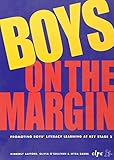
Price: £20.00
Publisher: Centre for Language in Primary Education
Genre: Non Fiction
Age Range: Books About Children's Books
Length: 112pp
Buy the Book
Boys on the Margin: Promoting Boys' Literacy Learning at Key Stage 2
How can teachers create the right conditions for underachievers, particularly boys, to become more enthusiastic and more successful readers and writers? The long held perception that some boys underachieve in literacy intensified when the key stage literacy tests started in the 1990s and boys’ literacy remains a central concern. This book shares the work of a group of classroom teachers in urban, multiethnic classrooms who took part in a CLPE research project. The findings are useful, interesting and, sometimes, quite surprising. For example they suggest that it is not always necessary to keep writing tasks short and sharp to retain boys’ interest and that boys do not always prefer non-fiction to fiction. It was when teachers were ‘allowed more time to explore really involving texts and time to develop writing’ that boys made promising progress. Perhaps we should not be surprised to find that learning to respond insightfully and imaginatively to books needs time and commitment.
The participating teachers worked with six key stage 2 classes over two terms on three texts: a poem, a short story and a novel. The main teaching strategies, identified as promising in other work on literacy and gender carried out by the CLPE team, were to provide time for reflective talk, for drama and for interactive ICT. The teachers were supported by the project leader who was able to gage the ‘literacy climate’ of the different classrooms and to see how this impinged on the progress of both boys and girls. Interestingly, the texts chosen might not immediately seem likely to appeal to boys. But their themes were involving when interpreted in a contemporary way by the children. The poem ‘What has happened to Lulu?’ by Charles Causley led to profound discussion on uncomfortable issues with modern relevance like violence, kidnapping and murder. The children were expected to work hard and formal work, for example on spelling, was included as well as a consideration of the structure of the poem. Some children read other poems by Charles Causley and wrote their own stanzas. Most of the boys responded enthusiastically when the project organizer opened an email account for the missing girl. The children emailed questions which the project researcher replied to as Lulu.
Not everything worked for every child. ‘The Seal Wife’, from Kevin Crossley-Holland’s collection, inspired lively talk and writing in some classes, about choices between being with your children or returning to your ‘true’ life for example, but some teachers felt the related CLPE software (which provided links to websites of online readings of other Selkie stories) was too difficult for some children.
There’s a Boy in the Girls’ Bathroom, by Louis Sachar, inspired boys to engage in collaborative talk and writing – the ‘social networking round texts’ which seems to come more naturally to girls. One class completed mini-journals prepared by the CLPE team which included writing prompts and free pages for writing and drawing. There were outstanding successes: Christopher, whose first language is Portuguese, did his most extended piece of writing ever. And Yusuf’s connection with the themes in the novel – about Bradley who has problems but who wants to change – brought about a breakthrough in his capacity for sustained, involved writing.
This is an enormously inspiring and helpful book: the children’s work is a pleasure to read and progress is analysed in sufficient detail to guide other teachers in their efforts to turn reluctant boy readers and writers on to literacy. More than this, the project teachers found that collaborative, social approaches to literacy and those that allowed more time to get deeper into the texts, worked not only with underachieving boys but with all the children in the class. So much so that they have continued to work in this way after the project ended. If more teachers adopt these approaches will future statutory assessments show improved scores for underachieving boys? They might, but these teachers and researchers conclude that the current summative assessment framework with its ‘one off’ tests is unlikely to reveal the kind of progress made by these young readers and writers with difficulties. Teachers’ formative assessments as part of the everyday work of the class are more likely to tap into their achievements.



